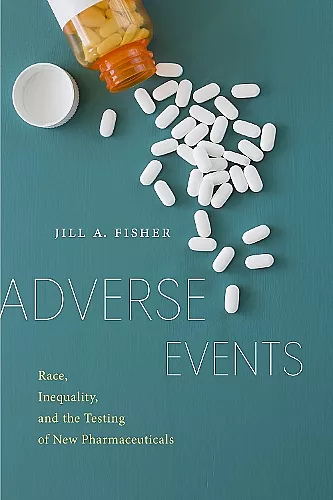Adverse Events
Race, Inequality, and the Testing of New Pharmaceuticals
Format:Hardback
Publisher:New York University Press
Published:12th May '20
Currently unavailable, and unfortunately no date known when it will be back

Winner, 2022 Donald W. Light Award for Applied Medical Sociology, given by the Medical Sociology Section of the American Sociological Association
Winner, 2021 Robert K. Merton Book Award, given by the Science, Knowledge, and Technology Section of the American Sociological Association
2021 Outstanding Academic Title, Choice Magazine
Explores the social inequality of clinical drug testing and its effects on scientific results
Imagine that you volunteer for the clinical trial of an experimental drug. The only direct benefit of participating is that you will receive up to $5,175. You must spend twenty nights literally locked in a research facility. You will be told what to eat, when to eat, and when to sleep. You will share a bedroom with several strangers. Who are you, and why would you choose to take part in this kind of study?
This book explores the hidden world of pharmaceutical testing on healthy volunteers. Drawing on two years of fieldwork in clinics across the country and 268 interviews with participants and staff, it illustrates how decisions to take part in such studies are often influenced by poverty and lack of employment opportunities. It shows that healthy participants are typically recruited from African American and Latino/a communities, and that they are often serial participants, who obtain a significant portion of their income from these trials.
This book reveals not only how social inequality fundamentally shapes these drug trials, but it also depicts the important validity concerns inherent in this mode of testing new pharmaceuticals. These highly controlled studies bear little resemblance to real-world conditions, and everyone involved is incentivized to game the system, ultimately making new drugs appear safer than they really are.
Adverse Events provides an unprecedented view of the intersection of racial inequalities with pharmaceutical testing, signaling the dangers of this research enterprise to both social justice and public health.
Jill Fisher has provided the most thorough examination [of Phase I trials] yet … the world that Fisher reveals in Adverse Events is unsettling. * New York Review of Books *
Adverse Events damns the industry with simple description, but Fisher’s analysis has a bigger concern. The industry is a symptom of the American problem of racist capitalism, and in the book, Fisher documents how a racist, wildly unequal economy leads people who are already in precarious positions to take part in first-in-human trials. Ten years ago, when she started her research, she could hardly have predicted its immediacy. * The New Republic *
This book presents weighty implications relative to current US economic and employment arrangements ... a helpful reference in courses on bioethics, biomedical research methods, social justice, gender and race/ethnicity, intersectionality studies, and the sociology of science. * CHOICE *
Adverse Events reveals the many and varied ways in which social inequalities—particularly class and race—compel individuals to become healthy volunteers for Phase I trials, despite the risks involved ... This is a text that can—and should—reach audiences beyond academia. * Medical Anthropology Quarterly *
May become a scholarly classic, change how the drugs we take are tested, and save billions in misleading trials that are not necessary. -- Donald W. Light, Rowan University School of Osteopathic Medicine
One of the best books of medical sociology I have ever read. Fisher describes the world of paid research subjects with remarkable insight and compassion. . . . Nothing short of brilliant. -- Carl Elliott, author of White Coat, Black Hat: Adventures on the Dark Side of Medicine
A mesmerizing ethnographic study that shows the safety of the pharmaceuticals we swallow depends on an invisible army of volunteers putting their bodies at risk for a quick dollar. -- Stefan Timmermans, University of California, Los Angeles
Offers an unflinching view of the inequities built in to the twenty-first-century clinical-trials industry. . . . Has as much to say about the micropolitics of stigma and adversity as it does about the macrostructures of health and capitalism today. -- Jeremy Greene, author of Generic: The Unbranding of Modern Medicine
Especially during the COVID-19 pandemic, its message is very important. * For Better Science *
Jill Fisher invites the reader into a sustained and systematic analysis of how pharmaceutical companies operate their Phase I drug trials and the symbiotic relationship between drug development and what she calls a “profound economic insecurity” on the part of the participants ... It is an important book for understanding broader sociological concepts of inequality, stigma, and pharmaceutical development. * Social Forces *
Leaves a striking impression on the reader ... Likely to be of interest to a broad audience. It is suitable for lay people who have an interest in exploring a largely unseen side of the pharmaceutical industry, people working in pharmaceuticals who wish to scrutinize the ins-and-outs of their industry, as well as students and academics such as bioethicists, sociologists, and those studying race and ethnicity * New Genetics and Society *
ISBN: 9781479877997
Dimensions: unknown
Weight: 635g
336 pages